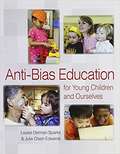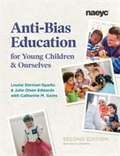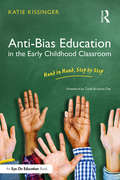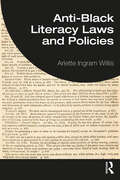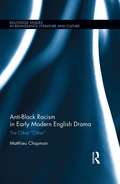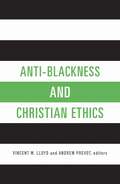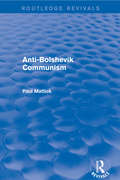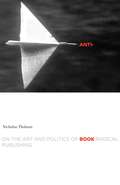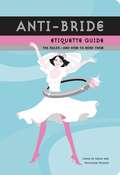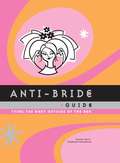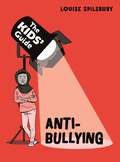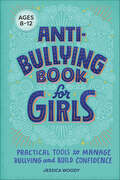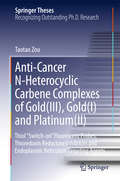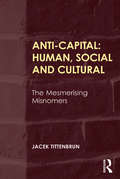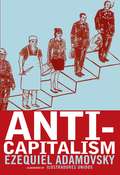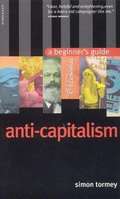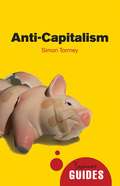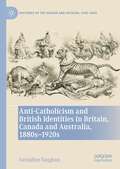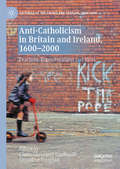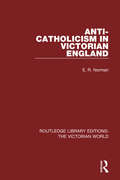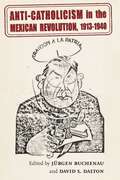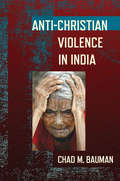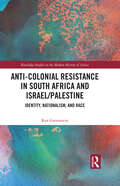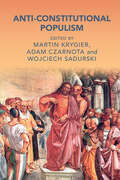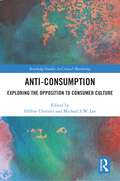- Table View
- List View
Anti-Bias Education For Young Children And Ourselves
by Louise Derman-Sparks Julie Olsen EdwardsProvides practical guidance to confront and eliminate barriers of prejudice, misinformation and bias about specific aspects of personal and social identity thus helping staff and children respect each other, themselves and all people.
Anti-Bias Education for Young Children & Ourselves
by Louise Derman-Sparks; Julie Olsen EdwardsThe result is a richer and more nuanced articulation of what is important in anti-bias education. Revolving around four core goals identity, diversity, justice, and activism individual chapters focus on culture and language, racial identity, family structures, gender identity, economic class, different abilities, and more.
Anti-Bias Education in the Early Childhood Classroom: Hand in Hand, Step by Step
by Katie KissingerAnti-Bias Education in the Early Childhood Classroom provides a useful, clearly outlined guide for implementing anti-bias and anti-oppression practices in early childhood education settings. Throughout the book, you’ll find: Stories from the field Strategies for keeping teaching practices in touch with growing social justice movements Tasks and questions to spark your professional growth in this important area Katie Kissinger uses her personal experience as a longtime educator to highlight both the challenges and the potential for transformative learning in the anti-bias classroom, and gives other teachers the tools they need to create classrooms that welcome all students and families.
Anti-Black Literacy Laws and Policies
by Arlette Ingram WillisA COUNTERNARRATIVE This groundbreaking book uncovers how anti-Black racism has informed and perpetuated anti-literacy laws, policies, and customs from the colonial period to the present day. As a counternarrative of the history of Black literacy in the United States, the book’s historical lens reveals the interlocking political and social structures that have repeatedly failed to support equity in literacy for Black students. Arlette Ingram Willis walks readers through the impact of anti-Black racism’s impact on literacy education by identifying and documenting the unacknowledged history of Black literacy education, one that is inextricably bound up with a history of White supremacy. Willis analyzes, exposes, illuminates, and interrogates incontrovertible historical evidence of the social, political, and legal efforts to deny equal literacy access. The chapters cover an in-depth evolution of the role of White supremacy and the harm it causes in forestalling Black readers’ progress; a critical examination of empirical research and underlying ideological assumptions that resulted in limiting literacy access; and a review of federal and state documents that restricted reading access for Black people. Willis interweaves historical vignettes throughout the text as antidotes to whitewashing the history of literacy among Black people in the United States and offers recommendations on ways forward to dismantle racist reading research and laws. By centering the narrative on the experiences of Black people in the United States, Willis shifts the conversation and provides an uncompromising focus on not only the historical impact of such laws and policies but also their connections to present-day laws and policies. A definitive history of the instructional and legal structures that have harmed generations of Black people, this text is essential for scholars, students, and policymakers in literacy education, reading research, history of education, and social justice education.
Anti-Black Racism in Early Modern English Drama: The Other “Other” (Routledge Studies in Renaissance Literature and Culture)
by Matthieu ChapmanThis is the first book to deploy the methods and ensemble of questions from Afro-pessimism to engage and interrogate the methods of Early Modern English studies. Using contemporary Afro-pessimist theories to provide a foundation for structural analyses of race in the Early Modern Period, it engages the arguments for race as a fluid construction of human identity by addressing how race in Early Modern England functioned not only as a marker of human identity, but also as an a priori constituent of human subjectivity. Chapman argues that Blackness is the marker of social death that allows for constructions of human identity to become transmutable based on the impossibility of recognition and incorporation for Blackness into humanity. Using dramatic texts such as Othello, Titus Andronicus, and other Early Modern English plays both popular and lesser known, the book shifts the binary away from the currently accepted standard of white/non-white that defines "otherness" in the period and examines race in Early Modern England from the prospective of a non-black/black antagonism. The volume corrects the Afro-pessimist assumption that the Triangle Slave Trade caused a rupture between Blackness and humanity. By locating notions of Black inhumanity in England prior to chattel slavery, the book positions the Triangle Trade as a result of, rather than the cause of, Black inhumanity. It also challenges the common scholarly assumption that all varying types of human identity in Early Modern England were equally fluid by arguing that Blackness functioned as an immutable constant. Through the use of structural analysis, this volume works to simplify and demystify notions of race in Renaissance England by arguing that race is not only a marker of human identity, but a structural antagonism between those engaged in human civil society opposed to those who are socially dead. It will be an essential volume for those with interest in Renaissance Literature and Culture, Shakespeare, Contemporary Performance Theory, Black Studies, and Ethnic Studies.
Anti-Blackness and Christian Ethics
by Vincent W. Lloyd Andrew PrevotAnti-black racism is a central ethical crisis of our time. In this volume, leading experts explore how Christian ideas, practices, and institutions can contribute to today's struggle for racial justice and how those ideas, practices, and institutions need to be re imagined in light of the challenges to white supremacy posed by today's movements for racial justice. The book will appeal to scholars, students, activists, and Christians of all races who believe that black lives matter.
Anti-Bolshevik Communism: Anti-bolshevik Communism (1978) (Routledge Revivals)
by Paul Mattick, Jr.This title was first published in 1978: Communism aims at putting working people in charge of their lives. A multiplicity of Councils, rather than a big state bureaucracy is needed to empower working people and to focus control over society. Mattick develops a theory of a council communism through his survey of the history of the left in Germany and Russia. He challenges Bolshevik politics: especially their perspectives on questions of Party and Class, and the role of Trade Unions. Mattick argues that a??The revolutions which succeeded, first of all, in Russia and China, were not proletarian revolutions in the Marxist sense, leading to the a??association of free and equal producersa??, but state-capitalist revolutions, which were objectively unable to issue into socialism. Marxism served here as a mere ideology to justify the rise of modified capitalist systems, which were no longer determined by market competition but controlled by way of the authoritarian state. Based on the peasantry, but designed with accelerated industrialisation to create an industrial proletariat, they were ready to abolish the traditional bourgeoisie but not capital as a social relationship. This type of capitalism had not been foreseen by Marx and the early Marxists, even though they advocated the capture of state-power to overthrow the bourgeoisie a?? but only in order to abolish the state itself.a??
Anti-Book: On the Art and Politics of Radical Publishing (Cultural Critique Books)
by Nicholas ThoburnNo, Anti-Book is not a book about books. Not exactly. And yet it is a must for anyone interested in the future of the book. Presenting what he terms &“a communism of textual matter,&” Nicholas Thoburn explores the encounter between political thought and experimental writing and publishing, shifting the politics of text from an exclusive concern with content and meaning to the media forms and social relations by which text is produced and consumed. Taking a &“post-digital&” approach in considering a wide array of textual media forms, Thoburn invites us to challenge the commodity form of books—to stop imagining books as transcendent intellectual, moral, and aesthetic goods unsullied by commerce. His critique is, instead, one immersed in the many materialities of text. Anti-Book engages with an array of writing and publishing projects, including Antonin Artaud&’s paper gris-gris, Valerie Solanas&’s SCUM Manifesto, Guy Debord&’s sandpaper-bound Mémoires, the collective novelist Wu Ming, and the digital/print hybrid of Mute magazine. Empirically grounded, it is also a major achievement in expressing a political philosophy of writing and publishing, where the materiality of text is interlaced with conceptual production. Each chapter investigates a different form of textual media in concert with a particular concept: the small-press pamphlet as &“communist object,&” the magazine as &“diagrammatic publishing,&” political books in the modes of &“root&” and &“rhizome,&” the &“multiple single&” of anonymous authorship, and myth as &“unidentified narrative object.&” An absorbingly written contribution to contemporary media theory in all its manifestations, Anti-Book will enrich current debates about radical publishing, artists&’ books and other new genre and media forms in alternative media, art publishing, media studies, cultural studies, critical theory, and social and political theory.
Anti-Bride Etiquette Guide
by Kathleen Hughes Carolyn GerinFollowing the best-selling Anti-Bride Guide and Bridesmaid's Guide down the aisle comes the essential, smart, and sassy etiquette guide for the not-so-traditional bride. This feisty and straightforward advice book fills a huge gap in the wedding etiquette market. A riot to read and packed with bold illustrations, it walks the bride through everything from invitations and seating arrangements to money matters and family feuds. Whether fielding classic conundrumswho pays for whator decidedly modern situationsthe maid of honor is a manAnti-Bride Etiquette Guide offers sensitive advice for skillfully navigating the rough spots. Inventive solutions for dodging outmoded traditions ensure that brides will keep everyone from grooms to grandmothers happy. For the bride who doesn't want to sacrifice the wedding of her dreams or her loved ones' feelings, Anti-Bride Etiquette Guide has the answers.
Anti-Bride Guide
by Carolyn Gerin Stephanie RosenbaumInto a sea of pearl white and pale blue comes the hot pink and orange Anti-Bride Guide. The perfect book for anyone alienated by the high-brow wedding industry, this practical guide fills a huge gap in the wedding planner market. A riot to read and filled with sassy illustrations, each chapter offers up fabulous advice and unusual ideas for those brides looking for more than the standard fare. Hundreds of fantastic tips give great insider advice on how to deal with any and all wedding eventualities (lipstick stain on dress, caterer from hell, wedding day breakout). A handy planner and resource guide keeps the bride on track, and tabbed chapters have pockets for stuffing brochures and clippings. For the bride who wants her wedding her way, this is the ultimate guide.
Anti-Bullying (The Kids' Guide)
by Louise SpilsburyYou might want to read this book because you are being bullied. Or maybe you know a person who is being bullied and you want to help them. Or perhaps you're worried that you're a bully and you want to understand why and how to stop... There are things you can do and there are things that other people can do to help you. This book will help you to get through this. Topics covered include frenemies, physical bullying, name-calling, teasing, being left out, cyberbullying and how to get help.Consultants from the Anti-Bullying Alliance provide expert advice and information.Other titles in The Kids' Guide series:Anti-RacismDealing with AnxietyDealing with DivorceDealing with DeathUnderstanding Autism
Anti-Bullying Book for Girls: Practical Tools to Manage Bullying and Build Confidence
by Jessica WoodyIn the Anti-Bullying Book for Girls, girls ages 8-12 will find supportive advice that addresses the unique challenges of girl-on-girl bullying and shows them how to boost their confidence, deal with bullying in the moment, and be more empathetic toward others.One of the toughest issues girls face is bullying, so stand up to it with this interactive guide! This standout among bullying books will help girls find their voice and put a stop to bullying, whether it's happening to them or to their friends. In addition to teaching kids to be kind, this hands-on guide can help girls:Better understand bullying—Get a breakdown of what bullying is, why it happens, the difference between bullying and teasing, and how girl bullying often looks different from boy bullying.Express themselves creatively—Girls will discover plenty of space to write and reflect on their experiences, plus drawing prompts, quizzes, affirmations, and more to help them battle bullying.Build healthy friendships—Empower girls with the tools to move on from a toxic friendship, disagree with others respectfully, and form great lifelong friendships.Give girls the tools and support they need to stop bullying in its tracks with Anti-Bullying Book for Girls!
Anti-Cancer N-Heterocyclic Carbene Complexes of Gold: Thiol “Switch-on” Fluorescent Probes, Thioredoxin Reductase Inhibitors and Endoplasmic Reticulum Targeting Agents (Springer Theses)
by Taotao ZouThis thesis focuses on the development of gold- and non-classical platinum-based anti-cancer agents that display distinctively different anti-cancer mechanisms compared to the commonly used cisplatin. These metal complexes contain N-heterocyclic carbene (NHC) ligands which are able to form strong M-C(NHC) bonds, conferring high stability and favorable lipophilicity, reactivity and binding specificity of metal complexes on biomolecules. The author demonstrates significant advances made in anti-cancer gold(III), gold(I) and platinum(II) complexes. Detailed chemical synthesis, in vitro and/or in vivo anti-cancer activities are clearly presented including: (i) a class of Au(III) complexes containing a highly fluorescent N^N^N ligand and NHC ligand that simultaneously act as fluorescent thiol "switch-on" probes and anti-cancer agents; (ii) a dinuclear gold(I) complex with a mixed diphosphine and bis(NHC) ligand displaying favorable stability and showing significant inhibition of tumor growth in two independent mice models with no observable side effects; and (iii) a panel of stable luminescent cyclometalated platinum(II) complexes exhibiting high specificity to localize to the endoplasmic reticulum (ER) domain, inducing ER stress and cell apoptosis. These works highlight the clinical potential that gold and platinum complexes offer for cancer treatment.
Anti-Capital: The Mesmerising Misnomers
by Jacek TittenbrunThe notion of capital has enjoyed a rich career in the social sciences, its use across a range of subjects and in diverse academic and professional contexts having served to establish its conceptual status as 'given'. With particular attention to human and social capital - including cultural capital - this book traces the roots of this theoretical and conceptual trend to economics, revealing the proliferation of various forms of capital to be based upon an encroachment of the conceptual apparatus of economics into other social sciences. Offering an in-depth, critical analysis of the concepts of human and social capital, as well as their surrounding theories, Anti-Capital: Human, Social and Cultural proposes an alternative theoretical framework, whilst better explaining the realities that they mask in economic terms. A rigorous exploration of the most popular forms of 'capital' in the contemporary social sciences, this book will be of interest to scholars and students of sociology, political and social theory, demography and economics.
Anti-Capitalism
by Ezequiel Adamovsky Marie TrigonaIn Anti-Capitalism, activist and scholar Ezequiel Adamovsky tells the story of the long-standing effort to build a better world, one without an abusive system at its heart. Backed up by arresting, lucid images from the radical artist group United Illustrators, Adamovsky details the struggle against rising corporate power, as that struggle unfolds in the halls of academia, in the pages of radical newspapers, and in the jungles and the streets. From Marx through the Battle of Seattle and beyond, Adamovsky traces the beliefs and politics of the major figures in the anticapitalist tradition and explores modern experiments in building different ways of living, in the process providing an indispensible primer for anyone interested in finding alternatives to the so-called "best system we have"--and anyone interested in joining the fight.
Anti-Capitalism: A Beginner's Guide
by Simon TormeySpecifically, the book tackles the questions: Who exactly are the anti-capitalists and what do they want? Simon Tormey examines the ideas of the various components that make up the movement: the anarchists and Marxists, the greens and environmentalists, the anti-corporate activists and utonomists, among many others. He looks in detail at how the movement operates its reliance on a unique combination of word-of-mouth, the internet, and communications technology.
Anti-Capitalism: A Beginner's Guide (Beginner's Guides)
by Simon TormeyThe puncture of the great banking bubble and the dash to austerity has breathed new life into protest movements across the globe and brought anti-capitalist values to the forefront as never before. But what does it mean to be anti-capitalist? And where is anti-capitalism going - if anywhere? Global civil society expert Simon Tormey explores these questions, and more, in this thought-provoking book.Unlike other, ideologically-narrow introductions, Tormey introduces us to all the eclectic groups - anarchists, Marxists, autonomists, environmentalists - and thought that make up the anti-capitalist movement. Providing global and historical context, he takes us from the 1994 Zapatista insurrection through the 1999 Seattle protests right up to Occupy Wall Street, the Indignados of Spain and the current Greek uprisings. Going beyond a mere descriptive take, Tormey weighs up a range of possibilities for bringing about alternatives to the corporate domination of our planet. This is a fascinating and bold exploration of how to understand the world - and how to change it.
Anti-Catholicism and British Identities in Britain, Canada and Australia, 1880s-1920s (Histories of the Sacred and Secular, 1700–2000)
by Geraldine VaughanRecent debates about the definition of national identities in Britain, along with discussions on the secularisation of Western societies, have brought to light the importance of a historical approach to the notion of Britishness and religion. This book explores anti-Catholicism in Britain and its Dominions, and forms part of a notable revival over the last decade in the critical historical analysis of anti-Catholicism. It employs transnational and comparative historical approaches throughout, thanks to the exploration of relevant original sources both in the United Kingdom and in Australia and Canada, several of them untapped by other scholars. It applies a 'four nations' approach to British history, thus avoiding an Anglocentric viewpoint.
Anti-Catholicism in Britain and Ireland, 1600–2000: Practices, Representations and Ideas (Histories of the Sacred and Secular, 1700–2000)
by Geraldine Vaughan Claire Gheeraert-GraffeuilleThis edited collection brings together varying angles and approaches to tackle the multi-dimensional issue of anti-Catholicism since the Protestant Reformation in Britain and Ireland. It is of course difficult to infer from such geographically and historically diverse studies one single contention, but what the book as a whole suggests is that there can be no teleological narration of anti-Catholicism – its manifestations were episodic, more or less rooted in common worldviews, and its history does not end today.
Anti-Catholicism in Victorian England (Routledge Library Editions: The Victorian World Ser. #36)
by E. NormanFirst published in 1968, this book provides an introduction to the subject of anti-Catholicism in Victorian England and a selection of illustrative documents. It demonstrates that Victorian ‘No Popery’ agitations were in fact almost the last expressions of a long English tradition of anti-Catholic intolerance and, in reality, the legal and socia
Anti-Catholicism in the Mexican Revolution, 1913-1940 (Diálogos Series)
by Jürgen Buchenau and David S. DaltonAnti-Catholicism in the Mexican Revolution, 1913–1940 examines anti-Catholic leaders and movements during the Mexican Revolution, an era that resulted in a constitution denying the Church political rights. Anti-Catholic Mexicans recognized a common enemy in a politically active Church in a predominantly Catholic nation. Many books have elucidated the popular roots and diversity of Roman Catholicism in Mexico, but the perspective of the Church’s adversaries has remained much less understood.This volume provides a fresh perspective on the violent conflict between Catholics and the revolutionary state, which was led by anti-Catholics such as Plutarco Elías Calles, who were bent on eradicating the influence of the Catholic Church in politics, in the nation’s educational system, and in the national consciousness. The zeal with which anti-Catholics pursued their goals—and the equal vigor with which Catholics defended their Church and their faith—explains why the conflict between Catholics and anti-Catholics turned violent, culminating in the devastating Cristero Rebellion (1926–1929).Collecting essays by a team of senior scholars in history and cultural studies, the book includes chapters on anti-Catholic leaders and intellectuals, movements promoting scientific education and anti-alcohol campaigns, muralism, feminist activists, and Mormons and Mennonites. A concluding afterword by Matthew Butler, a global authority on twentieth-century Mexican religion, provides a larger perspective on the themes of the book.
Anti-Christian Violence in India (Religion and Conflict)
by Chad M. BaumanDoes religion cause violent conflict, asks Chad M. Bauman, and if so, does it cause conflict more than other social identities? Through an extended history of Christian-Hindu relations, with particular attention to the 2007–2008 riots in Kandhamal, Odisha, Anti-Christian Violence in India examines religious violence and how it pertains to broader aspects of humanity. Is "religious" conflict sui generis, or is it merely one species of intergroup conflict? Why and how might violence become an attractive option for religious actors? What explains the increase in religious violence over the last twenty to thirty years?Integrating theories of anti-Christian violence focused on politics, economics, and proselytization, Anti-Christian Violence in India additionally weaves in recent theory about globalization and, in particular, the forms of resistance against Western secular modernity that globalization periodically helps to provoke. With such theories in mind, Bauman explores the nature of anti-Christian violence in India, contending that resistance to secular modernities is, in fact, an important but often overlooked reason behind Hindu attacks on Christians. Intensifying the widespread Hindu tendency to think of religion in ethnic rather than universal terms, the ideology of Hindutva, or "Hinduness," explicitly rejects both the secular privatization of religion and the separability of religions from the communities that incubate them. And so, with provocative and original analysis, Bauman questions whether anti-Christian violence in contemporary India is really about religion, in the narrowest sense, or rather a manifestation of broader concerns among some Hindus about the Western sociopolitical order with which they associate global Christianity.
Anti-Colonial Resistance in South Africa and Israel/Palestine: Identity, Nationalism, and Race (Routledge Studies in the Modern History of Africa)
by Ran GreensteinThis book provides a comparative historical study of the rise and evolution of anti-colonial movements in South Africa and Israel/Palestine. It focuses on the ways in which major political movements and activists conceptualised their positions vis-a-vis historical processes of colonial settlement and indigenous resistance over the last century. Drawing on a range of primary sources, the author engages with theoretical debates involving key actors operating in their own time and space. Using a comparative framework, the book illustrates common and divergent patterns of political and ideological contestations and focuses on the relevance of debates about race and class, state and power, ethnicity and nationalism. Particular attention is given to South Africa and Israel/Palestine’s links to global campaigns to undermine foreign domination and internal oppression, tensions between the quests for national liberation and equality of rights, the role of dissidents from within the ranks of settler communities, and the various attempts to consolidate indigenous resistance internally while forging alliances with other social and political forces on the outside. This book will be of interest to scholars in the fields of African History, Middle East History, and African Studies, and to social justice and solidarity activists globally.
Anti-Constitutional Populism (Cambridge Studies in Law and Society)
by Martin Krygier Wojciech Sadurski Adam CzarnotaAround the world, populist parties have sprung up in formerly and formally liberal-democratic polities, challenging their existing political parties and leaders, and frequently overwhelming them. These challenges and successes were rarely predicted, arriving so soon after the wave of liberal democratic and constitutional enthusiasms, proclamations and institution-building which peaked in the 1990s. Bringing together scholars from law, political science and philosophy, this collection explores the character of contemporary populisms and their relationships to constitutional democracy. With contributors from around the world, it offers a diverse range of nuanced perspectives on populism as a global phenomenon. Using comparative and multi-disciplinary techniques, this book considers the specifics and similarities of populisms, and raises general questions about their nature and potential futures.
Anti-Consumption: Exploring the Opposition to Consumer Culture (Routledge Studies in Critical Marketing)
by Hélène Cherrier Michael S W LeeIn this edited volume, the leading scholars in the field engage with consumers, marketers, corporations and policymakers as well as space dynamics and network formation to provide an in-depth examination of anti-consumption: a voluntary behavioural inclination to minimise rather than grow, to decelerate and simplify and to reduce the unnecessary exploitation of resources fuelled by consumer culture. This book does not place anti-consumption on the high moral ground but rather demonstrates its complexity to spur innovative and critical thinking on how people, organisations, businesses and governments can treat consumption more as a necessity for survival than as a tool for self-expression, pleasure and economic growth. The first part of this book looks at anti-consumption from a diversity of perspectives. It analyses voluntary simplicity, a self-motivated engagement in consumption reduction, and boycotting, a politically-motivated reaction against unacceptable corporate practices, as distinct manifestations of anti-consumption that nonetheless remain rooted in the logic of the market. Paving the way to critical perspectives on the interface between anti-consumption, people and the environment, the second part of the book projects anti-consumption to issues of waste production and provides possible answers to global challenges of resources depletion, social inequalities and global warming. In this section, anti-consumption is critically assessed as an actor of change, both in terms of social change and paradigm change. To move the field forward, the third part of this book presents several theoretical frameworks that help set a roadmap for future research. Anti-Consumption will be of direct interest to scholars and researchers within the fields of marketing, consumer research, business studies, environmental studies and sustainability. It will also be of value to those researching the economics and/or sociology of markets.
